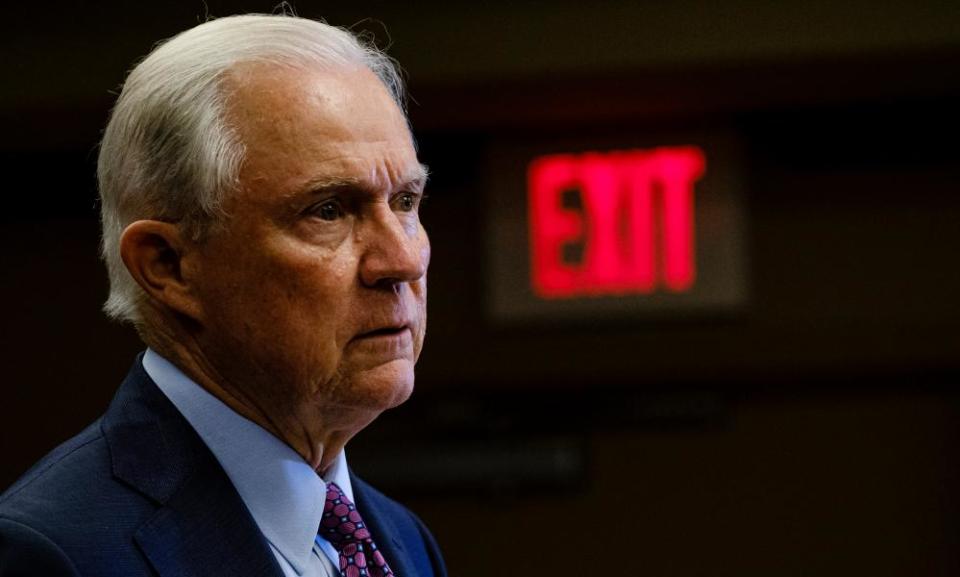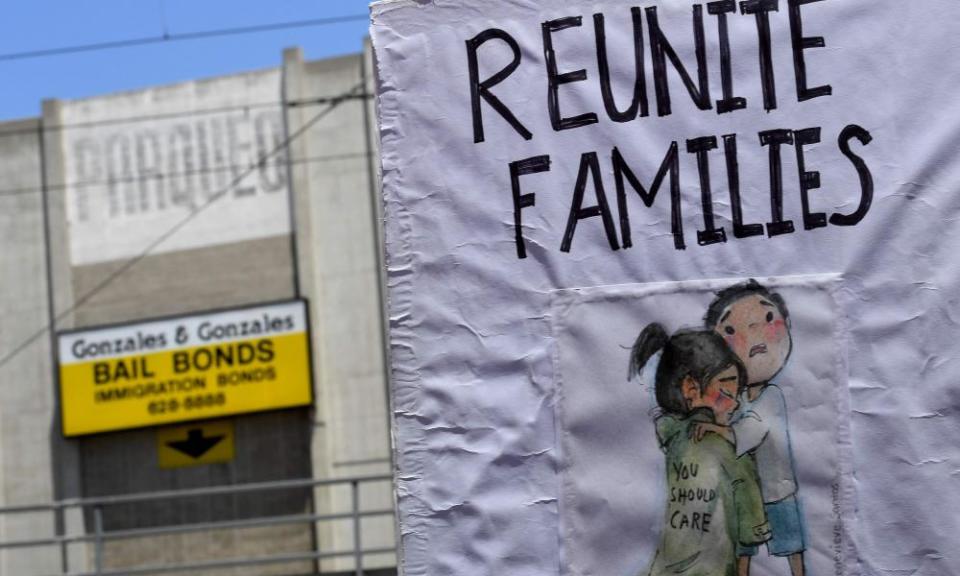Jeff Sessions impeded inquiry into role in Trump’s family separation policy

Former attorney general Jeff Sessions and other senior justice department officials impeded an internal departmental investigation into their role in implementing the Trump administration’s hardline immigration policy that separated thousands of children from their parents on the border, according to interviews and government records.
Sessions declined to be interviewed by investigators for the department’s inspector general, who conducted an inquiry of the family separation policy, according to a report made public last Thursday by the IG detailing the findings of its inquiry.
As attorney general, Sessions was one of the Trump administration’s most senior officials who devised and implemented the family separation policy. The inspector general, Michael Horowitz, called Sessions and his top aides a “driving force” behind the policy.
A second senior justice department official, Edward C O’Callaghan, who served as the justice department’s principal associate deputy attorney general during the family separation policy, similarly refused to answer questions from investigators, according to the report.
Former deputy attorney general Rod Rosenstein, who now says he regrets his role in implementing the policy, was twice interviewed by investigators, but made misleading statements to them that understated and obscured his role.
As a result of the refusal by Sessions and O’Callaghan to speak to investigators, and Rosenstein having misled the IG, a full historical accounting may never take place into what is perceived as a dark chapter in the nation’s history when more than 3,000 children were separated from their parents. Many of its victims younger than the age of five, some even infants, were held alone at substandard facilities under inhumane conditions.
The Biden administration has promised to reunite families. On 8 January , Biden vowed “our justice department and our investigative arms will make judgements about who is responsible … and whether or not the conduct is criminal”. If such a criminal investigation was undertaken, investigators would have powerful tools available to compel testimony of recalcitrant witnesses.

A senior federal law enforcement official said that while other former justice officials have refused to cooperate with various other IG’s investigations, they could not recall another instance in which an investigation was impeded because an attorney general refused to cooperate, a second senior department official refused to as well, and the deputy attorney general misled investigators.
That combination raised questions, the official said, as to whether there was a coordinated effort emanating from the highest levels of the justice department to sabotage the investigation.
Sessions and O’Callaghan were the only two government officials asked to provide information who refused to cooperate. Of all the other 45 individuals with whom the IG sought to speak to, all agreed; some sitting for several interviews, others doing so in adverse circumstances because of the Covid-19 pandemic.
O’Callaghan’s potential testimony was crucial to the investigation not only because his own role in implementing the family separation policy was under scrutiny, but also because he was such a close adviser to the attorney general and Rosenstein.
O’Callaghan declined to comment.
Some investigators also concluded Rosenstein misled them by downplaying his own role in the family separation policy.
Rosenstein told the IG that “he did not think he saw the draft of the [family separation] policy before it was issued; and asserted that while “the AG and his staff were intimately involved” in devising and implementing the policy, Rosenstein himself was “less likely to have been engaged”.
But records previously published by the Guardian and the New York Times directly contradict those claims – clearly demonstrating that Rosenstein ratcheted up the policy by pressing US attorneys on the US-Mexico border to detain more children.
The records further indicate that several US attorneys and their aides had severe reservations regarding the inhumanity of the policy, and concerns that by diverting resources to carrying out the policy would interfere with the prosecution of far more serious crimes. One federal prosecutor in Texas complained that, as a result of so much energy and resources being devoted to the effort, “sex offenders were released” who otherwise would have remained imprisoned.
Rosenstein told investigators that he gave prosecutors broad discretion not to bring cases they did not want to: “If somebody got the idea that they were supposed to be just like a soldier, prosecuting every case without regards to the facts, that didn’t come from me.”
But other US attorneys who Rosenstein supervised told the IG that they were ordered to bring cases they did not want to. One, John Bash, of the western district of Texas, wrote in a memo to other prosecutors that he was told by Rosenstein “per the AG’s policy, we should NOT be categorically declining immigration prosecutions … because of the age of the child.” Bash, who recently left the justice department, explained further: “No one] in this office, including me, had any discretion on whether to accept if we were under the zero tolerance requirement from the attorney general.”
After release of the report, Rosenstein said that he now regretted his involvement in the policy: “Since leaving the department, I have often asked myself what we should have done differently … It was a failed policy that never should have been proposed or implemented.”
Those comments stand in sharp contrast to earlier comments Rosenstein made to the inspector general defending the policy in high-minded terms by saying: “The attorney general I think was very clear in his view that [there was a] failure by the department to sufficiently prosecute immigration with the rule of law, and the statistics bore that out.”
As a former attorney general, Sessions was evading questions from the very department he once headed. To do so, he relied on a loophole in the law that allowed former department officials to escape any consequences from cooperating with investigators once they were out of office.
Justice officials who refuse to cooperate with investigators, while in their job, are subject to and are almost always fired from their jobs – a firing carried out by the attorney general. Thus Sessions, by regulation and longstanding norms, was tasked with firing officials for the very thing he himself did.
As a senior justice official, O’Callaghan privately endorsed reforms that would have allowed the justice department’s inspector general to compel testimony from recalcitrant witnesses. In not testifying himself, though, O’Callaghan was acting in direct contradiction to his earlier support of a standard that he himself had long supported.

 Yahoo Finance
Yahoo Finance 